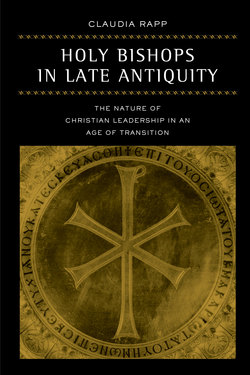Holy Bishops in Late Antiquity

Реклама. ООО «ЛитРес», ИНН: 7719571260.
Оглавление
Claudia Rapp. Holy Bishops in Late Antiquity
Отрывок из книги
In honor of beloved Virgil—
“O degli altri poeti onore e lume . . .”
.....
John here couches his acknowledgment of the general applicability of these virtues in the context of the historical narrative of the spread and expansion of the Christian church, a story in which bishops played an instrumental role. He also notes that the episcopate is not an honor, but a function, with reference to the etymology of episkopein, “to be an overseer.” 70 This concession to the realities of ecclesiastical leadership is offset by John’s other writings, most notably his On the Priesthood, discussed below, where he sketches a more lofty picture of the ideal bishop as a high priest.
A very similar approach was taken by Theodore of Mopsuestia, John Chrysostom’s friend from the time they spent together in Libanius’s classroom and later in a monastery near Antioch. His theological position on the two natures of Christ came under scrutiny during the Three Chapters controversy, with the result that his works were banned as heretical in 553. Like John Chrysostom, Theodore also wrote a treatise titled On the Priesthood, but the text does not survive. However, his exegetical commentary on the Pauline epistles, which includes a treatment of the First Letter to Timothy, invites a comparison of the views of these two friends. Theodore concedes, just like John, that the historical origin of the episcopate lies in a range of practical administrative tasks, as indicated in the leading sentence of Paul’s remarks (1 Tim. 3:1): “Whoever aspires to the office of bishop desires a noble task.” Theodore’s commentary on this passage survives only in Latin, where the Greek ergon (translated in the NRSV as “task”) is rendered with its exact Latin equivalent opus: “He does well to call it ‘work’ and not honor, for the discharge of ecclesiastical duties is not an honor, but work.”71 Theodore also agrees with John Chrysostom that the virtues required by Paul of an episkopos are not very demanding. John had explained this with reference to historical exigency that created the need for a large number of bishops of whom, it is implied, one ought not to expect too much. Theodore, by contrast, demands that the bishop should strive to match his elevated status within the church by intensifying his efforts to adhere to the code of conduct laid down by Paul.
.....